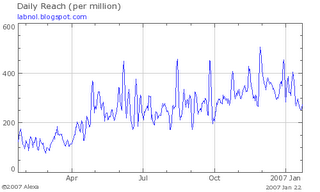 The last few weeks at Digital Inspiration have been quite interesting.
The last few weeks at Digital Inspiration have been quite interesting. Some of our blog posts managed to get on the radar screens of eminent blogging personalities like Jeff Jarvis, Nicholas Karr, Robert Scoble, Dave Winer, Darren Rowse, Michael Parekh and Steve Rubel.
Just wanted to share a couple of differences between getting noticed by A-listers vs getting on the Digg front pages:
Increase in Site Traffic - Digg will flood your blog with new visitors so much so that your web-host may even confuse that new traffic with a DDoS attack. On the other side, the traffic coming from A-list blogs might be disappointing - you may see regular traffic increasing by 1K or 2K but nothing drastic.
Diggers will just Digg - If the Digg flood likes your post, they'll probably increase the Digg count by 1 and leave. The A-list traffic is likely to spread the word by bookmarking to del.icio.us or even blog about the post by adding their own perspective or opinion.
Digg Discourages, A-listers Encourage - The traffic from A-list blog will leave meaningful comments that add value to the conversation. The Digg crowd will never leave comments on your site but they'll do so on the actual Digg page. In most case, the comments (or curses) from Diggers will make you feel depressed unless you write about Kevin Rose, Diggination or 10 Reasons Why Vista Sucks.
RSS Subscribers - The majority of Digg crowd will visit your site for one-tenth of a second. On the other hand, visitors from A-list bloggers will relatively spend more time on your blog, they'll be interested in the blogger profile and may eventually subscribe. So you might notice an upswing in RSS subscribers after getting noticed by A-listers.
Blog Revenue - Traffic is never proportional to revenue if you're using Adsense or other advertising programs that are a mix of CPC and CPM ads. You might notice higher page impressions during Digg days but the CTR and effective CPM will reduce so the net result would stay the same. The situation maybe slightly different when you have CPM ads on the blog.
Page Rank - Getting on Digg is unlikely to boost your page rank or search engine rankings - infact, there are cases when the Digg pages rank higher than the actual page it is linking to. But getting on A-list blogs will probably bring lot of Google and Technorati Juice.